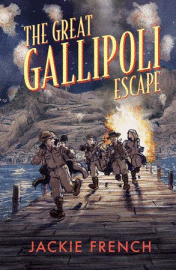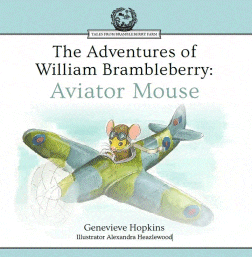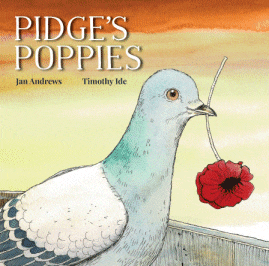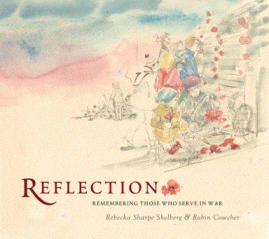
The Great Gallipoli Escape
The Great Gallipoli Escape
Jackie French
HarperCollins, 2023
224pp., hbk., RRP $A19.99
9781460764176
Sixteen-year-old Nipper and his Gallipoli mates Lanky, Spud, Bluey and Wallaby Joe are starving, freezing and ill-equipped. By November 1915 they know that that there is more to winning a war than courage, that the Gallipoli campaign has been lost, and that the reality of war is very different from the pictures and perceptions painted in the posters at home touting war as an adventure, a way out of inevitable unemployment, a ticket to see the world that few in isolated Australia would ever get, and that to fight “for King and country” was as noble as it gets for those with strong ties to England in early 20th century Australia – calls to arms that compelled many like Nipper to lie about their age so they would be allowed to join the army to defend their country.
As with Last Man Out, this story, based heavily on accounts in primary sources like letters, diaries, oral histories and memories, takes the reader into the disease, deprivation and desperation of life in the trenches that were the origins of “diggers” the nickname for Australian soldiers, and while Nipper and his mates are fictitious, what they experienced was real. As author Jackie French, renowned for her research and attention to detail when she crafts historical fiction, says, this is “still only one story… there are possibly one hundred thousand stories, all of which might vary in many respects, but still be true.”
Nipper has played cricket with the Turks in the opposing dugout, dodged rocket fire and rescued desperate and drowning men when the blizzard snow melted. He is one of the few trusted with the secret kept from even most of the officers: how an entire army of 150 000 men, their horses and equipment will vanish from the Peninsula, secretly moved to waiting ships over three impeccably planned nights without a single life lost – but a plan that leaves those still alive with the very mixed feelings of seeing an opportunity for their own salvation while being reluctant to leave behind those who endured so much and gave their lives for something seemingly futile.
“Will we be remembered for holding the line here, in a campaign that has won nothing and lost so much?”
And that question is just one of many philosophical discussion points that takes this book beyond an historic narrative. What was and is the legacy of Gallipoli? Why do we still commemorate a failed campaign more than a century later, and why is commemorating it in Gallipoli, itself, such a milestone for so many?
Apart from the discussion points and activities that relate directly to the book raised in the teaching notes, there are some outstanding opportunities to explore some big-picture questions and really extend students’ thinking such as
- How does historical fiction (as opposed to fiction set in the past) enrich and enhance our understanding of life and living during significant events and times?
- Given that the Turks were defending their families and livelihoods from invasion by the ‘Tommies’ and their allies, were they necessarily the enemy? Were the invaders in the wrong?
- Are there parallels between the allies invading Turkey and the Russians invading Ukraine? What are the differences in approach this time?
- The lads in the stories could be the older brothers of those reading it so, if Australia were to put “boots on the ground” in Ukraine, as they did in Iraq and Afghanistan, would they be as eager to join up today as Nipper and his mates were? Why?
- Have attitudes to conflict changed in the past century, and if they have or haven’t, why?
To me, quality historical fiction inspires the reader to think beyond the story, to the what-ifs, and the why-dids, and this book has certainly done that on both the professional and personal level because between this and Last Man Out I am learning more and more about what my grandfather experienced and why he didn’t share his stories (even if I had known to ask) and how that shaped him, and ultimately me. How being named after Lord Kitchener impacted my father’s life so that my brother, currently on his way to Villers-Bretonneux, will then make his way again to the anniversary of the Battle of Crete where dad was captured on his 25th birthday – just two of those 100 000 stories that had their roots in those eight months on a remote Turkish beach. How many more will be inspired to investigate their own?





